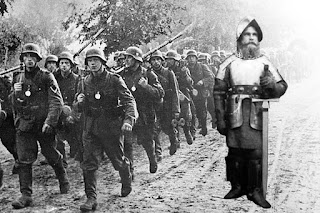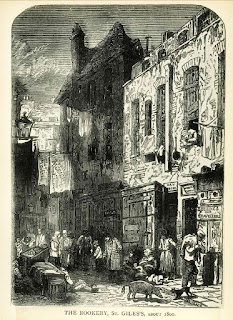World Without Light: May 19,1780 America's Dark Day and the Glow of Independence
Friday morning begins normally enough. It is cloudy and overcast, a little gloomy with a slight chill in the air but it is nothing that the residents of New England aren’t used to. After all, this time of year the temperature does fluctuate rapidly, with one day being warm and humid, summerlike, and the next cold and stark almost like winter.
It is May 19, 1780 and the New England and Mid-Atlantic states have been in the grip of America’s War for Independence for over five years. Much of the countryside is ravaged, many of the cities are still under British control, but led by George Washington, the Continental Army of the United States continues to survive and the spirit of American patriotism is proving resilient and indomitable. There is reason for both hope and despair, but no one expects what this day is about to bring.
At around ten in the morning the overcast sky begins to change colors turning from a pink to a red and then to a never before seen dark copper tint. By noon the skies above all of New England are nearly as dark as night. Witnesses in Boston report that by midday candles are required to read and to even see one another inside. Lanterns are needed all afternoon to simply walk the streets outside.
In the darkness a light and oily rain begins to fall. The air smells of soot and soon, to everyone’s astonishment, ash and cinder begin to fall from the sky. For three hours it rains ash on the heads and rooftops of New Englanders. Witnesses in New Hampshire report later that up to half a foot of ash will accumulate on the ground before the day is over.
May 19, 1780 will be referred to later on as New England’s Dark Day, but when it occurs it terrifies everyone who lives through it.
In an era when it could take weeks for news to travel from state to state, many Americans believed that the Dark Day signaled the end of the world. Thousands of people rushed into and packed their local churches and viewed the anomalous occurrence through the lens of religion.
Many preached that May 19, 1780 was the long awaited Day of Judgement.
“The Day of Judgement is either approaching or it is not. I choose to be found doing my duty. I wish, therefore, that candles be brought.”
--Abraham Davenport, Connecticut State Senator, May 19, 1780.
Though the Dark Day of 1780 appeared to be a message from God that came out of the blue, research shows that there were many signs reported in diaries and personal correspondence of the time, which reported strange and unusual weather anomalies in the day’s leading up to The Dark Day,
For several days across states from New Hampshire to New Jersey the sky was reported as being smokey and yellow and it was said that the moon glowed red and gave off little to no ambient light. The air on the day prior to May 19, 1780 was said to be thick and heavy all across the northeast United States and George Washington who had his headquarters in Morristown, New Jersey on the dark day recorded in his diary on May 18, 1780 that there were, “dark and heavy uncommon kinds of clouds...dark, but at the same time, with a reddish light intermixed with them.”
On the morning of May 19,1780 the 10,000, or so soldiers of the Continental Army of the United States were encamped in northern New Jersey, centered around General Washington’s headquarters at Morristown. It was the second time during the war that the fledgling army had found itself encamped between Philadelphia and New York City, keeping a watchful eye on their numerically superior British adversaries as the war raged back and forth across the New Jersey countryside.
Like everyone else, American soldiers were dumbfounded by the Dark Day, and by noon campfires blazed outside tents as the troops gazed skywards with an apprehensive and watchful eye, waiting for the darkness to dissipate.
Joseph Plumb Martin, a soldier who served for the duration of the war in the Continental Army reported in his memoirs that, “We were in New Jersey at the time the ‘dark day’ happened. The people had to light candles in their houses to enable them to see or to carry on their daily business. The night was uncommonly dark as the day was.”
In total, it would take over a day and half before The Dark Day would dissipate. Joseph Plumb Martin would live to be ninety years old. He would serve the duration of the war, serving in nearly all of the Continental Army’s major battles and attaining the rank of Sergeant before finally being discharged from the army after the British surrender at Yorktown in October of 1781.
His narrative of his service in the American Revolution would not be written until Martin was seventy years old and was designed to give attention to the plight of surviving Continental Army veterans who were seeking pensions for their service decades later. It is interesting to note that the Dark Day left such an imprint on his memory, that even many decades later in old age, Martin still chose to give it considerable attention in his memoir, “A Narrative of Some of the Adventures, Dangers and Sufferings of a Revolutionary Soldier”. This proves that to Revolutionary era Americans, the Dark Day, was a phenomena that left such an imprint on their collective psyche that it was something that they could never forget.
It would be erroneous to believe that all American’s on the Dark Day of May 19, 1780 acted piously or patriotically.
Many believed, as reported in newspapers in the wake of The Dark Day, that the strange phenomena was a form of divine retribution. These Tories, those loyal to the British, said that the Dark Day was an ominous sign of God’s displeasure with the American Revolution. They argued that the Dark Day would be followed by much more calamitous disasters from God, such as plagues of locusts of Biblical proportions, or floods and pestilence, if the upstart Americans did not repent of their violent ways and rejoin the fold of the British Empire.
Also, not all American’s took advantage of the Dark Day to rush to church and pray. Some took advantage of the darkness to hide their sins and lecherous behavior. In many towns, taverns and alehouses stayed open all day and night, and drunken revelers caroused through the streets for over a day and a half.
In Salem Massachusetts, a group of a dozen drunken sailors in conjunction with an equal number of the town’s local prostitutes were said to have spent most of the night openly fornicating in the town square before vandalizing most of the city.
At the time, in the immediate wake of The Dark Day, causes reported in newspapers were just as varied as reactions to the Dark Day itself. Some clung steadfastly to the Divine Judgement Theory while most more scientific observers attributed the Dark Day to a long lasting solar eclipse or even to dust from a passing comet that had somehow gotten suspended in the air. Some attributed the day to a near apocalyptic meteor shower.
So what was The Dark Day of May 19, 1780?
As it turns out, dark days like the one of May 19, 1780 are not completely unknown. Quite a few “dark days” similar to the one of 1780 have been reported throughout the world during the course of history. As recently as the 1950’s similar days of darkness have been reported in Canada and in parts of the upper northwest of the United States.
Researchers, basing their conclusions on tree ring data, have found that in large parts of Canada, New England and today’s American midwest, forest fires burned out of control at the start of the year 1780 and caused an enormous accumulation of ash, soot and smoke to form in the earth’s lower atmosphere. This accumulation in conjunction with fog and overcast weather conditions caused what would forever be known as The Dark Day of May 19, 1780.
The Dark Day may have a completely reasonable scientific explanation, but to our American ancestors who fought so valiantly for their freedom, the Dark Day represents one more challenge that they all over came; one more inexplicable fear that they all faced on their collective American journey towards freedom and independence.







Comments
Post a Comment